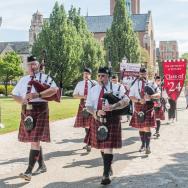As the University of Chicago enters an academic year unlike any other, students, faculty and staff are finding unique ways to nurture a sense of social connection and intellectual discovery.
This Autumn Quarter, those efforts are taking place both online and in socially distanced spaces. Through innovative courses and programs, the UChicago community continues to explore everything from their nearby surroundings to faraway, imaginary worlds.
Outdoor inspiration
On the first day of in-person classes Monday, Prof. Jessica Stockholder invited her students to the Midway Plaisance to find art inspiration in the outdoors.
Across the one-mile stretch of campus greenery, 14 students set up easels underneath the changing leaves—a welcome reprieve from typical online courses.
“With the COVID-19 pandemic and the shutdown of in-person classes, I was quite worried about the future of artmaking,” said Timnah Rosenshine, a third-year student majoring in visual arts and religious studies. “Jessica’s class piqued my interest because it seemed to embrace our unique circumstance as opposed to pretending that artmaking exists in a vacuum.”
An artist who works at the intersection of painting and sculpture, Stockholder designed the three-week class, “Painting Matters: En Plein Air,” to help students think through the history and formal devices of painting. Given the constraints of remote learning, Stockholder wanted to take advantage of fall weather and teach outdoors—where she and students could safely engage from a distance.
“Making art is always an endeavor to make sense of one’s own intersection with the world around you,” said Stockholder, the Raymond W. and Martha Hilpert Gruner Distinguished Service Professor of Visual Arts. “Working outdoors allows for a very particular, more complex world than the screen of your computer.
“Sometimes, landscape painting is about how one sees the landscape. Sometimes, it’s about how the landscape can be a metaphor for all kinds of things in life.”
The course will continue to meet outdoors for the most part, weather allowing, and will include access to some online presentations and discussions.
Back in the lab
Across the University, scientists have begun returning to their laboratories.
But some, like graduate student Saara-Anne Azizi, are already accustomed to the enhanced safety procedures. Azizi was part of a massive, multi-lab effort that received special permission to go back to the lab early in order to do COVID-19 research. Working with masks, gloves and at reduced capacity, she helped screen compounds that might be able to fight the virus.
“I think now that we’ve been doing this for months, we really appreciate how normal it can feel,” said Azizi, who is working toward degrees in chemistry and medicine. “The day-to-day mechanics of the research are the same, and there’s so much going on outside the lab that we all want to be doing something.”
With fewer people allowed in the lab, research that’s normally a solitary pursuit can sometimes feel even more isolated, Azizi said. But at the same time, the circumstances have made her appreciate her goals even more.
“It reminded me how important to me that the research I do is working towards improving people’s lives,” she said. “It’s really important to me to be doing work for others. “Doing COVID-19 research was the first time my research felt so direct and immediate.
Planetary settlers
A new online role-playing game promises to put a new twist on remote learning this academic year—while giving UChicago students a chance to envision a better, more just world.
Students from across disciplines will design and build a virtual world, collaborating as the crew of a space colony ship traveling from Earth to a newly terraformed exoplanet. The game, called ExoTerra, will help them consider problems on Earth—such as inequality and climate change—and ways to avert them through innovations in laws, ecosystems and energy networks.
“Looking past our own reality toward other ways of living and being that are equally possible is often the beginning of dynamic change and innovative new ideas about politics, technology and culture,” said Assoc. Prof. Ada Palmer, ExoTerra’s main orchestrator. “Throughout history, those ideas have often originated in imaginary spaces first, and been created second.”
The game will run over the entire academic year, and will be offered as a component of multiple classes each quarter. Students also can participate as an extracurricular activity outside of class.
A Renaissance historian and an award-winning science fiction novelist, Palmer is teaching one of the courses with an ExoTerra component—“Europe’s Intellectual Transformations”—and writing the overarching plot for the game. Other courses offered during Autumn Quarter include “Education and Social Inequality,” “Global Warming: Understanding the Forecast” and “Public Policy Practicum: Interview Project on Policing.”
Experts from Earth in many fields are making guest appearances advising on science, politics and other issues; alums interested in joining as guest experts are welcome to contact Palmer.
Homecoming Week goes virtual
The University community is invited to “celebrate UChicago in mind, body and school spirit” during this year’s Digital Homecoming Week.
Six days of intellectual and extracurricular activities will begin Oct. 12 with Maroon Monday, in which the University community is encouraged to show their school spirit on social media. Two other UChicago traditions also will be held virtually this year—the Homecoming banner competition (vote for your favorites online Oct. 12-17) and Family Weekend, which the undergraduate College will host Oct. 16-17.
Other highlights of Homecoming Week include the 40th anniversary of Humanities Day, an architectural tour of campus, a discussion of the upcoming election, a class on craft beer and an OI-led celebration of ancient games. See the full list of events here.
Curating art
The pandemic has presented an existential challenge to museums across the country, limiting their ability to welcome guests. To adjust to this reality, the Smart Museum of Art has instituted free, reservation-only visits—with time slots available Thursdays through Sundays.
The Smart is currently hosting two exhibitions: a seven-year survey of the work of Berlin-based artist Claudia Wieser, open through Dec. 13; and Take Care, which draws extensively from the museum’s own collection.
Open through March 21, Take Care explores what it means to care for something, someone or ourselves. It also includes a section for guest curators; artwork nominations are accepted on a rolling basis, and selections rotate every three weeks. The first comes from Asst. Prof. Brian Callender of UChicago Medicine, who chose Song Yongping’s My Parents, a series of photographs taken over several years.
“At its core, this series depicts the universal experience of illness and aging, processes that strip us bare and expose our vulnerabilities,” Callender wrote on the Smart Museum’s blog. “It is in these moments of vulnerability that acts of care are expressed and relationships of caring are formed, strengthened and shattered. In these moments, we require care.”
As part of Homecoming Week, Callender will participate in an Oct. 15 panel discussion on Take Care. The event will also include Andrea Yarbrough, founder of the initiative in c/o Black women, and will be moderated by Divinity School graduate student Aneesah Ettress.
A physician who explores the use of the humanities in capturing the patient experience, Callender also helped create The Fetus in Utero, a 2019 exhibition at the UChicago Library’s Special Collections Research Center. He and co-curator Margaret Carlyle, a former UChicago postdoc, recently collaborated with the Research Computing Center to relaunch the exhibition online.
—This story includes contributions from Louise Lerner, Jack Wang and Max Witynski.

